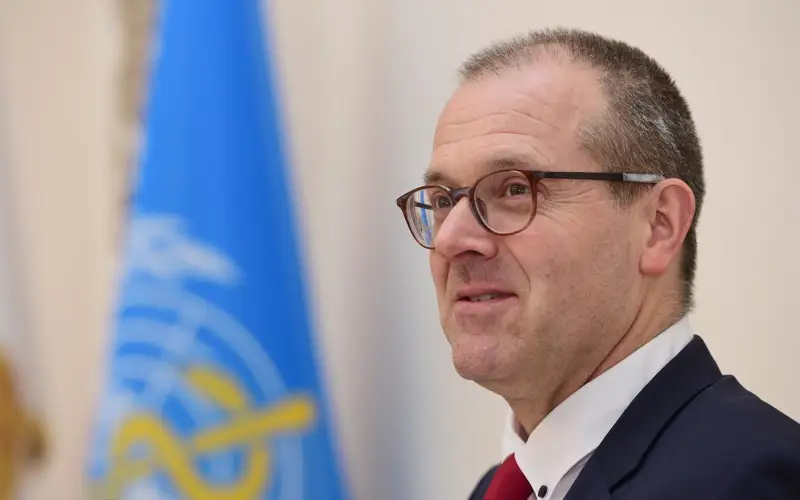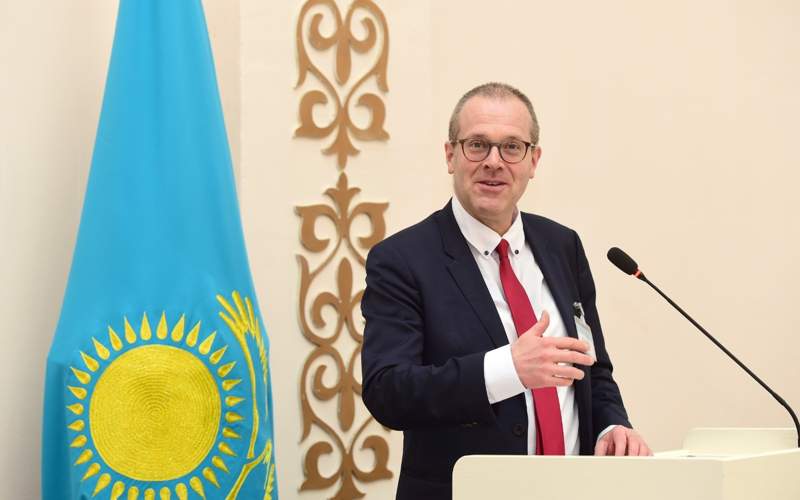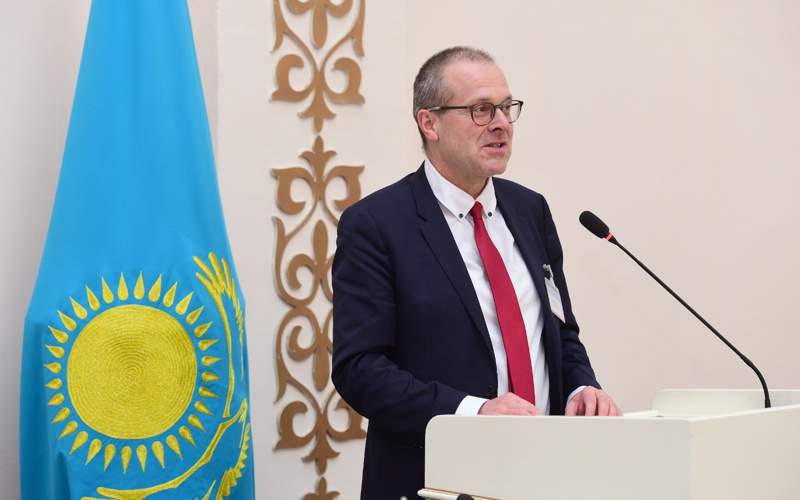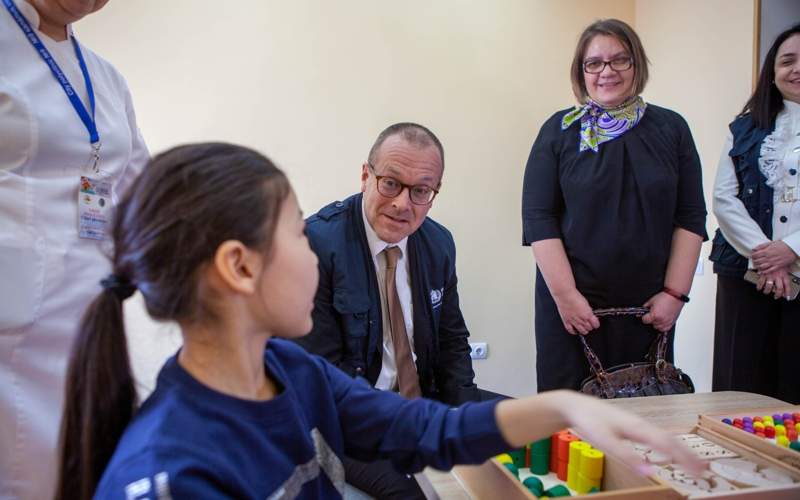Why investing in healthcare in Central Asia, including Kazakhstan, is vitally significant: Interview with WHO Regional Director Hans Kluge
“Investing in healthcare is not only beneficial for improving public health but also significantly boosts the national economy” shares Hans Kluge, the World Health Organization's (WHO) Regional Director for Europe. In an exclusive interview with Kazinform, Kluge stresses the vital significance of healthcare investments in Central Asian countries today, emphasising Kazakhstan's crucial role and the key areas that require outside financing. Also, providing insights into the next International Investment Forum in Healthcare in Central Asia, which is scheduled for June 26–27 in Bishkek, and future plans for Kazakhstan’s healthcare.

Please tell us about the main Agenda of the upcoming International Investment Forum in Healthcare in Central Asia, which will be held in Bishkek on June 26-27. How relevant are investments in healthcare in Central Asian countries today? How much investment has been made in healthcare in Central Asian countries over the past 5 years, including Kazakhstan?
Let’s be clear from the outset: investing in health is an investment in the future of our countries and societies. The two-day Central Asia International Health Investment Forum, beginning tomorrow in Bishkek, Kyrgyzstan, will serve as a crucial platform for discussing and driving healthcare investments across the region.
The primary objective of the forum is threefold: to build new partnerships for health investment projects and technical assistance; to share best practices for achieving health-related Sustainable Development Goals (SDGs); and to emphasize the importance of investing in health as a catalyst for sustainable development, in line with the WHO Roadmap for Health and Well-being in Central Asia.
Central Asia is a unique region, home to 76.5 million people and a demographic powerhouse with 30% of its population aged 14 years or under. This makes investing in healthcare here even more critical, especially after the COVID-19 pandemic exposed the vulnerabilities in both our local and global health systems and economies. With pressing health challenges like the rapid spread of HIV and tough-to-treat tuberculosis, the region needs robust health systems more than ever, which can only be built through strategic investments and strong international cooperation.

From 1 January 2022 until 30 March 2024, the WHO Regional Office for Europe has mobilized a total of USD 101.780 million to support health initiatives in the Central Asian region, including USD28,3 million in Kazakhstan. But there is a shared understanding that we need to do much more to strengthen health systems and achieve health-related Sustainable Development Goals.
Investing in health doesn’t just make us healthier – it also makes our economies more stable and ensures regional security. So, this Forum represents a major step toward a healthier and more stable future for everyone in Central Asia.
Taking this opportunity, I would like to express my heartfelt gratitude to President Kassym-Jomart Tokayev and Health Minister Dr. Akmaral Alnazarova for their close collaboration with the WHO Regional Office for Europe and our Country Office in Kazakhstan, led by Dr. Skender Syla, as well as for supporting our regional health initiatives. Health is truly a collective effort and I very much look forward to our continued collaboration in the years ahead.
In your opinion, in which areas of healthcare in Kazakhstan are foreign investments especially needed and for what?
Kazakhstan has made notable strides in healthcare since gaining independence, with significant improvements in life expectancy and reducing mortality rates. The country has successfully met various global health targets, including those related to maternal and child mortality. Central to these achievements is the implementation of Universal Health Coverage (UHC), which has seen a significant increase from covering 38.7% of the population in 2000 to 75.9% of the population in 2019. This ensures that people can access essential health services without financial hardship, supported by robust primary healthcare systems.

Despite these successes, challenges persist that could impact the achievement of the Sustainable Development Goals. These include high premature mortality from non-communicable diseases, suicides and road traffic injuries, along with insufficient health financing, relatively high out-of-pocket spending and environmental hazards. To address them, the World Health Organization has facilitated a Roadmap for Health and Well-being with Central Asian countries. Endorsed by regional leaders in Dushanbe in September 2022, the Roadmap highlights 11 critical areas for investment and partnership, including enhancing primary healthcare, improving health governance, advancing digital healthcare transformation, and strengthening health security.
Investments are particularly needed in these areas to bridge gaps and enhance health outcomes. By focusing on these priorities, Kazakhstan can continue to advance its healthcare system and achieve long-term health and well-being goals.
What procedures are necessary to attract foreign investment in the field of healthcare?
Investing in healthcare is not only beneficial for improving public health but also significantly boosts the national economy. Contrary to the misconception that healthcare investments drain economic resources, they actually contribute substantially to economic and social goals. Healthcare drives economic growth, creates jobs, and enhances social cohesion and workforce efficiency, ranking among the top sectors that positively impact the GDP.
Health policymakers should confidently promote the economic advantages of investing in health systems. This can be achieved by adopting a wellbeing economy approach, where investment decisions prioritize social, economic, and human well-being, ultimately reducing inequalities and stabilizing the economy. For instance, Iceland's investments in wellbeing, guided by a comprehensive framework of indicators, have led to strong GDP growth, high employment, and improved life expectancy and satisfaction.
Additionally, embracing innovation in healthcare is crucial. Central Asian countries should be open to innovative practices, including digital health solutions and artificial intelligence, to attract foreign investments and meet modern healthcare challenges.

Lastly, demonstrating tangible results is essential for securing investment. Health systems need to show accountability, quality, and impact, such as increased health worker productivity or successful health reforms, to build trust with investors and underscore the sector's role as an economic engine. WHO/Europe supports this by helping countries showcase the health sector's contribution to economic growth and job creation under effective policy conditions.
It is known that last year the Ministry of Health of the Republic of Kazakhstan and the WHO European Bureau signed an agreement for 2024-2025. What has already been done under this agreement? What are the expected results of this agreement?
As part of the new Biennial Collaborative Agreement (BCA) for 2024-2025, WHO will continue to provide Kazakhstan with capacity building, technical expertise, and support in areas where there has been fruitful collaboration, including mother and child health, prevention of non-communicable diseases (NCDs), health emergencies preparedness, infection prevention and control, digital health, immunization, mental health, and environment and health.
Additionally, WHO plans to enhance support in healthcare financing and financial protection and human resources for health. Key initiatives already launched include two Pandemic Fund projects to strengthen health emergency readiness and the One Health approach, the first intersectoral health promoting schools plan, and the dissemination of the adverse childhood experience study.
Other significant actions include the implementation of master classes for midwives, training of trainers for cervical cancer prevention, development of a national telehealth strategy, and assessments of public health laboratories and health financing systems. These efforts are designed to fortify Kazakhstan’s healthcare infrastructure and improve public health outcomes in the country.
You have been heading the WHO Regional Office for Europe since 2020. Please tell us about the main achievements during this period that were implemented in Kazakhstan.
Kazakhstan has a proud history as a leader in global health, as the birthplace of the historic Alma-Ata Declaration of 1978, and the Astana Declaration on Primary Health Care in 2018 – both of which were celebrated in 2023 during the 73rd Regional Committee for the WHO European Region. Let me expresses my gratitude to the Kazakhstan government for its unwavering commitment to the Primary Health Care (PHC) agenda. Additionally, we acknowledge that Kazakhstan’s PHC expertise is being disseminated globally with WHO/Europe’s support.

Since 2020 we have significantly enhanced our operations in Kazakhstan, collaborating closely with the Ministry of Health and other key national health agencies. WHO has mobilized over USD9.4 million to provide technical support and facilitate the delivery of medical equipment and supplies. We have also helped secure two grant projects from the Pandemic Fund, contributing an additional $20 million to enhance health emergency preparedness and promote multisectoral collaboration through the One Health approach.
A major achievement has been the training of over 20,000 healthcare professionals in a variety of critical areas, including infection prevention, laboratory skills, antimicrobial resistance, case management, mental health, disease surveillance and prevention, immunization, and digital health. Notably, Kazakhstan became the first country to fully implement the Global Laboratory Leadership Program. To further ensure the sustainability of our capacity-building efforts, we have collaborated with medical universities to enhance undergraduate curricula in mental health and One Health.
WHO has also supported the Government of Kazakhstan in implementing significant public health initiatives. These include the introduction of new legislation on tobacco products and the development of strategic policies and plans concerning infection prevention, laboratory management, and antimicrobial resistance.
It’s worth noting that on the ground we closely work with other UN agencies, particularly on bringing attention to women and children’s well-being. For instance, in November last year together with other UN Agencies the WHO Country Office participated in the organization of an interactive art installation titled “Untold”, dedicated to "16 Days of Activism Against Gender-Based Violence". The idea behind this event was to shed light on the untold stories of violence and discrimination against women and girls. It’s a fact, that gender-based violence (GBV) has significant and long-lasting impacts on physical and mental health. It’s crucial to address GBV within a health systems approach, ensuring survivor-centered care and support for mental health and psychosocial well-being. We have also conducted several crucial research projects aimed at reducing NCD risk factors, enhancing infection prevention, improving mental health services, and strengthening the health information system. These initiatives have been crucial in ensuring that health strategies in Kazakhstan are evidence-based and effective.

